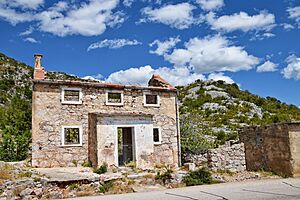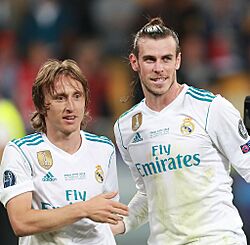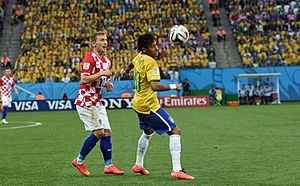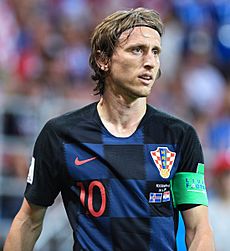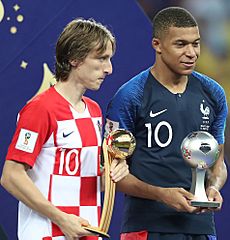Luka Modrić facts for kids

Modrić in 2022
|
|||||||||||||||||||||||||
| Personal information | |||||||||||||||||||||||||
|---|---|---|---|---|---|---|---|---|---|---|---|---|---|---|---|---|---|---|---|---|---|---|---|---|---|
| Full name | Luka Modrić | ||||||||||||||||||||||||
| Date of birth | 9 September 1985 | ||||||||||||||||||||||||
| Place of birth | Zadar, SR Croatia, SFR Yugoslavia | ||||||||||||||||||||||||
| Height | 1.72 m (5 ft 8 in) | ||||||||||||||||||||||||
| Position(s) | Midfielder | ||||||||||||||||||||||||
| Team information | |||||||||||||||||||||||||
|
Current team
|
AC Milan | ||||||||||||||||||||||||
| Number | 14 | ||||||||||||||||||||||||
| Youth career | |||||||||||||||||||||||||
| 1996–2000 | Zadar | ||||||||||||||||||||||||
| 2000–2003 | Dinamo Zagreb | ||||||||||||||||||||||||
| Senior career* | |||||||||||||||||||||||||
| Years | Team | Apps | (Gls) | ||||||||||||||||||||||
| 2003–2008 | Dinamo Zagreb | 94 | (26) | ||||||||||||||||||||||
| 2003–2004 | → Zrinjski Mostar (loan) | 25 | (8) | ||||||||||||||||||||||
| 2004–2005 | → Inter Zaprešić (loan) | 18 | (4) | ||||||||||||||||||||||
| 2008–2012 | Tottenham Hotspur | 127 | (13) | ||||||||||||||||||||||
| 2012–2025 | Real Madrid | 394 | (30) | ||||||||||||||||||||||
| 2025– | AC Milan | 0 | (0) | ||||||||||||||||||||||
| International career‡ | |||||||||||||||||||||||||
| 2001 | Croatia U15 | 2 | (0) | ||||||||||||||||||||||
| 2001 | Croatia U17 | 2 | (0) | ||||||||||||||||||||||
| 2003 | Croatia U18 | 7 | (0) | ||||||||||||||||||||||
| 2003–2004 | Croatia U19 | 11 | (1) | ||||||||||||||||||||||
| 2004–2005 | Croatia U21 | 15 | (2) | ||||||||||||||||||||||
| 2006– | Croatia | 188 | (28) | ||||||||||||||||||||||
|
Medal record
|
|||||||||||||||||||||||||
|
|||||||||||||||||||||||||
| *Club domestic league appearances and goals, correct as of 00:09, 10 June 2025 (UTC) ‡ National team caps and goals, correct as of 00:10, 10 June 2025 (UTC) |
|||||||||||||||||||||||||
Luka Modrić (born 9 September 1985) is a Croatian professional footballer. He plays as a central midfielder for Serie A club AC Milan. He is also the captain of the Croatia national team. Many people think he is one of the best midfielders ever. He is also considered the greatest Croatian player of all time.
Modrić started his professional career in Croatia with Dinamo Zagreb in 2003. He then played on loan for other teams like Zrinjski Mostar and Inter Zaprešić. In 2008, he moved to the Premier League club Tottenham Hotspur. He helped Spurs qualify for the UEFA Champions League in 2010, which was a big deal for the club. In 2012, Modrić joined Real Madrid. He won many titles there, including six UEFA Champions League trophies. He also won four La Liga titles and two Copa del Rey titles. He left Real Madrid in July 2025 to join AC Milan.
Luka Modrić has won many individual awards. In 2018, he won the Ballon d'Or. This was special because he was the first player other than Lionel Messi or Cristiano Ronaldo to win it since 2007. He also won the Best FIFA Men's Player award and the UEFA Men's Player of the Year Award. He has been named in the FIFPRO World 11 six times. In 2019, he received the Golden Foot award for his amazing career.
Modrić first played for Croatia in 2006. He has played in every major tournament Croatia has qualified for. This includes the UEFA Euro tournaments and the FIFA World Cups. At the 2018 FIFA World Cup, he led Croatia to the final. He won the Golden Ball as the best player of the tournament. In 2021, he became Croatia's most capped player. At the 2022 FIFA World Cup, he helped his team finish third. He won the Bronze Ball for being the third-best player. He has also been named Croatian Footballer of the Year a record thirteen times.
Contents
Early Life and Challenges
Luka Modrić was born on 9 September 1985 in Zadar, Croatia. He grew up in a small village called Modrići. His childhood was during the Croatian War of Independence. In 1991, his family had to leave their home because of the war. His grandfather, also named Luka, was sadly killed. The family's house was burned down.
Modrić and his family became refugees. They lived in hotels in Zadar for several years. His father joined the Croatian Army. During these tough times, bombs often fell on the city. Football became a way for Luka to escape the difficulties of war. He remembers it as a hard time that made him stronger. He also said he didn't fully understand the war because he played with other children.
He started playing football in the hotel parking lot. In 1992, he began primary school and joined a sports academy. His family used their little money to pay for it. He was inspired by famous footballers like Zvonimir Boban and Francesco Totti.
Starting His Football Journey
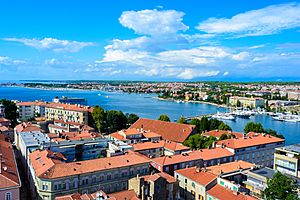
Luka Modrić trained at NK Zadar with coach Domagoj Bašić. The head of the youth academy, Tomislav Bašić, was like a "sporting father" to him. Modrić was considered too small and light by some clubs. Because of this, he wasn't signed by Hajduk Split, a big club in his region.
But he showed great talent at a youth tournament in Italy. So, Tomislav Bašić helped him move to Dinamo Zagreb when he was 16. After playing for Dinamo Zagreb's youth team, Modrić was loaned to Zrinjski Mostar in Bosnia in 2003. He was named the Bosnian Premier League Player of the Year at just 18. He later said playing there made him tough.
The next year, he was loaned to Inter Zaprešić in Croatia. He helped them finish second in the league. He also won the Croatian Football Hope of the Year award in 2004. He returned to Dinamo Zagreb in 2005.
Success at Dinamo Zagreb
In the 2005–06 season, Modrić signed a long-term contract with Dinamo Zagreb. He used his earnings to buy a flat for his family. He became a key player, scoring 7 goals and helping the team win the league. Dinamo won the league again in the 2006–07 season. Modrić was named the Prva HNL Player of the Year.
The next season, Modrić became team captain. He helped Dinamo try to qualify for the 2007–08 UEFA Cup. He scored a penalty against Ajax, helping Dinamo win the play-off. He finished his time at Dinamo with 31 goals and 29 assists. Dinamo also won the Croatian Cup that season. Fans gave him a standing ovation in his last home match.
Playing for Tottenham Hotspur
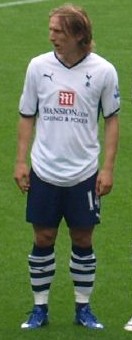
Luka Modrić joined Tottenham Hotspur in April 2008 for £16.5 million. He wore the number 14 jersey, honoring Johan Cruyff. He made his Premier League debut in August 2008.
Modrić had a slow start at Tottenham. He had a knee injury and some people thought he was too small for the Premier League. But Modrić said critics made him stronger. He started playing as a central midfielder, which helped him show his talent. He scored his first goal for Tottenham in December 2008.
Becoming a Key Player
Before the 2009–10 season, manager Harry Redknapp praised Modrić. He called him "a manager's dream" because he worked so hard. In August 2009, Modrić broke his right leg and was out for six weeks. He returned in December and scored a goal against West Ham United.
In May 2010, Modrić signed a new six-year contract. He said he wanted to achieve great success with Tottenham. He helped Tottenham reach the UEFA Champions League for the first time. He was named the Tottenham Hotspur Player of the Year at the end of the 2010–11 season. Even Sir Alex Ferguson, the Manchester United manager, said Modrić was his player of the year.
In 2011, Chelsea tried to sign Modrić, but Tottenham rejected their offers. Modrić wanted to move to a bigger club. He even refused to play in a match to try and force a move. But Tottenham kept him. He continued to play well, scoring important goals. He scored his last goal for Tottenham in May 2012.
Becoming a Real Madrid Star
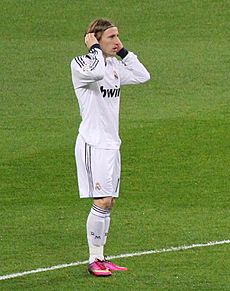
On 27 August 2012, Luka Modrić joined Real Madrid. He signed a five-year contract. He made his debut two days later against Barcelona, helping Real Madrid win his first trophy. At first, Modrić found it hard to settle in. He missed pre-season training due to his transfer. He often played out of his usual position. Some Spanish newspapers even called him the "worst signing of the season."
But things changed in March 2013. He scored a fantastic long-range goal against Manchester United in the Champions League. This match is often seen as the turning point for Modrić at Real Madrid. He started playing better and became a key player in midfield. He was known for making many successful passes.
Winning the Champions League
With new manager Carlo Ancelotti, Modrić became a regular starter. He was known for his accurate passing, with 90% accuracy in La Liga. He also won the ball back more than any other player. He scored his first goal of the 2013–14 season in the Champions League.
Modrić helped Real Madrid win the 2013–14 Copa del Rey against Barcelona. In the Champions League semi-final, he helped Real Madrid reach the final for the first time in 12 years. In the final, he assisted Sergio Ramos's late goal, which tied the game. Real Madrid went on to win 4–1 in extra time, winning their tenth Champions League title, known as La Décima. He was named the "Best Midfielder" in Spain for that season.
In August 2014, Modrić signed a new contract until 2018. He continued to play a vital role. In late 2014, he got a thigh injury and missed three months. His absence was seen as a big reason why Real Madrid struggled. He was chosen for the FIFA FIFPro World XI by other professional players.
More Champions League Trophies
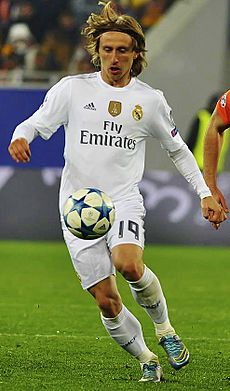
When Zinedine Zidane became manager in January 2016, Modrić became even more important. He was called the "master of the game" and the "connector" between defense and attack. He scored a winning goal against Granada. Modrić was a regular starter when Real Madrid won the 2015–16 Champions League final against Atlético Madrid. He was included in both the Champions League and La Liga teams of the season. He also won the "Best Midfielder" award again.
In October 2016, Modrić signed a new contract until 2020. He won the 2016 FIFA Club World Cup with Real Madrid. In January 2017, he was named in the UEFA Team of the Year for the first time. He played his 200th match for Real Madrid in March 2017.
Modrić was a key player when Real Madrid won 2016–17 La Liga and the 2016–17 UEFA Champions League. He assisted a goal in the final against Juventus. He became the first Croatian to win the Champions League three times. He was also named the Best Midfielder of the Champions League season.
Ballon d'Or Winner
For the 2017–18 season, Modrić took over the famous number 10 jersey. In December, he won the 2017 FIFA Club World Cup and was named the best player of the tournament. He was included in the UEFA Team of the Year again. Modrić was a regular starter when Real Madrid won their third straight Champions League title in 2018. He was named Best Midfielder of the Champions League season for the second time.
Because of his amazing performances for both club and country at the 2018 FIFA World Cup, Modrić won many big awards. In August and September, he won the UEFA Men's Player of the Year Award and The Best FIFA Men's Player Award. In December, he won the 2018 Ballon d'Or. This was a huge achievement, as he was the first player other than Messi or Ronaldo to win it since 2007. He was also the first Croatian player to win these awards. He was included in the FIFA FIFPro World XI for the fourth time.
Modrić said winning these awards showed that "all dreams can come true" with hard work. He dedicated the Ballon d'Or to other players who deserved to win it in the past.
Later Years at Real Madrid
Modrić continued to play for Real Madrid. In August 2018, he played in the UEFA Super Cup. In December, he won his third 2018 FIFA Club World Cup. He scored a goal and assisted another in the final. In January 2019, he scored in two league games in a row for the first time. He was included in the UEFA Team of the Year for the third time. Even though Real Madrid had a tough season, he was still included in the FIFA FIFPro World XI for the fifth time.
In August 2019, Modrić celebrated seven years with Real Madrid. He wanted to "recapture his best form" that season. He won the Golden Foot award in November. In January 2020, he scored his 100th career goal. He helped Real Madrid win the 2019–20 Supercopa de España. After the COVID-19 break, Modrić was praised for his excellent play despite his age. He helped Real Madrid win the league title.
In October 2020, he scored his first goal of the 2020–21 season in the Champions League. He became one of only four players aged 35 or more to score for Real Madrid in the competition. He also scored his first goal in El Clásico against Barcelona. In May 2021, he extended his contract until 2022.
More Trophies and Records

In October 2021, Modrić played his 400th game for Real Madrid. In December 2021, he played his 100th Champions League game. In January 2022, he scored in the 2022 Supercopa de España Final, becoming the oldest goalscorer in the competition's history. He helped Real Madrid win their 35th Spanish title in April 2022. In May, he won his fifth Champions League title. He was included in the UEFA Champions League Squad of the Season for the sixth time. In June 2022, he renewed his contract until 2023.
In August 2022, Modrić scored and assisted in a win against Celta Vigo. In September, he scored in his first Champions League game of the season. He became the eighth Real Madrid player with 100 appearances in the competition. In February 2023, he was included in the FIFA FIFPro World XI for the sixth time. In May, he won his second Copa del Rey trophy. In June, he extended his contract until 2024.
During the 2023–24 season, Modrić became vice-captain. He played his 500th game for Real Madrid in October 2023. He also became the oldest Real Madrid player to appear in the Champions League and La Liga. He won his fourth La Liga title and his sixth Champions League title. He became the first player to win six Champions League finals, along with Dani Carvajal.
Captaincy and Departure from Real Madrid
On 17 July 2024, Modrić extended his contract until 2025 and became captain of Real Madrid. A month later, he won his fifth Super Cup trophy. This made him the most decorated player in the club's history with 27 titles. In October, he became the oldest player to play a competitive match for Real Madrid. In December, he won his 28th title with the club, the FIFA Intercontinental Cup.
On 3 January 2025, Modrić scored his first goal of the 2024–25 season. He became the oldest player to score for Real Madrid in all competitions. He also joined the top ten on Real Madrid's all-time appearances list. In February, he scored another impressive goal against Girona.
On 22 May 2025, it was announced that Modrić would leave Real Madrid after 13 years. He played his last home game on 24 May, receiving a special tribute from the club and players. Many called it the "end of an era." He played his final matches for Real Madrid at the 2025 FIFA Club World Cup.
Playing for AC Milan
On 14 July 2025, Modrić joined Serie A club AC Milan on a free transfer. He signed a one-year contract with an option for another year.
International Career with Croatia
Modrić started playing for Croatia's youth teams. He played for the under-15, under-17, under-18, under-19, and under-21 teams. He made his full international debut for Croatia on 1 March 2006. It was a friendly match against Argentina, which Croatia won 3–2.
First Major Tournaments
Modrić played in two matches at the 2006 FIFA World Cup. He scored his first goal for Croatia in a friendly win against world champions Italy in August 2006.
He played very well in Croatia's UEFA Euro 2008 qualifying campaign. He helped Croatia beat England twice. At Euro 2008, he scored Croatia's first goal from a penalty. He became the team's youngest ever goalscorer at the European Championships. He continued to impress and was named UEFA Man of the Match against Germany. In the quarter-final against Turkey, Croatia lost in a penalty shootout. Modrić was included in the UEFA Euro 2008#UEFA Team of the Tournament.
World Cup and Euro Appearances
Modrić scored three goals in the 2010 World Cup qualifiers. But Croatia did not qualify for the tournament. He played in all of Croatia's UEFA Euro 2012 qualifying matches. He also played in all three group stage matches at UEFA Euro 2012. His performance against Spain was especially notable.
Modrić and the Croatian team qualified for the 2014 FIFA World Cup. They were in a group with hosts Brazil, Mexico, and Cameroon. Croatia lost to Brazil and Mexico and did not make it past the group stage.
In the Euro 2016 qualifying rounds, Modrić scored his first goals for Croatia in three years. He scored a long-range shot against Malta on his 29th birthday. He also captained Croatia for the first time. At UEFA Euro 2016, he scored the winning goal against Turkey with a powerful shot. He became the first Croatian to score in two different European Championships. Croatia lost to Portugal in the round of 16.
Golden Ball at the 2018 World Cup
For Croatia's 2018 World Cup qualifying campaign, Modrić became the new team captain. He played his 100th appearance for the national team. He helped Croatia qualify for the World Cup.
At the 2018 FIFA World Cup, Modrić was a key player for Croatia's "second Golden Generation." He scored a penalty against Nigeria and a long-range goal against Argentina. He was named Man of the Match in both games. He was ranked as the best player of the group stage by many sports experts.
In the knockout stages, Modrić continued to shine. He scored in the penalty shootouts against Denmark and Russia, helping Croatia advance. In the semi-final, Croatia beat England to reach the World Cup final for the first time ever. Although Croatia lost 4–2 to France in the final, Modrić was awarded the Golden Ball as the best player of the tournament. He was also included in the Team of the Tournament.
Bronze Ball at the 2022 World Cup
Modrić scored two goals in the Euro 2020 qualifying rounds. The tournament was postponed due to the COVID-19 pandemic. In March 2021, Modrić became the most capped player in Croatia's history.
At UEFA Euro 2020, Modrić scored a goal and provided an assist against Scotland. His goal made him Croatia's oldest ever goalscorer at the European Championships.
During the 2022 World Cup qualifying, Modrić scored three times and assisted twice. In June 2022, he scored a penalty in Croatia's first-ever win against France. In November, Modrić was selected for Croatia's final squad for the 2022 FIFA World Cup. He was named Man of the Match in two group stage games. He became the first player to play in both the European Championship and the World Cup in three different decades. Croatia reached the semi-finals but lost to Argentina. In the third place play-off, Croatia won 2–1 against Morocco. Modrić won the Bronze Ball as the tournament's third-best player.
Recent International Play
In March 2023, Modrić became the oldest player to play a game for Croatia. In June 2023, he led Croatia to victory over Netherlands in the semi-finals of the 2023 UEFA Nations League Finals. He won a penalty, assisted a goal, and scored a penalty himself. Croatia finished second after losing to Spain in the final.
In May 2024, Modrić was included in the final squad for UEFA Euro 2024. He became one of only three players to feature in five European Championships. In a match against Italy, he scored a goal, becoming the oldest goalscorer at the European competition. However, Croatia was eliminated from the tournament. In March 2025, he captained Croatia in the 2024–25 UEFA Nations League quarter-finals.
How He Plays the Game
Luka Modrić is a talented midfielder. He is known for his quick passing and long-range shots. He often uses a special technique called trivela. He stays calm under pressure and can get away from defenders easily. He is also very smart tactically and can play well in both attack and defense. He has great vision and works very hard.
Modrić used to play as an attacking midfielder. But later, he became a deep-lying playmaker. This means he plays deeper in midfield, controlling the game and creating chances for his teammates. He said this role helped him "read the game better" and show his "creativity." He is also good at winning the ball back from opponents. This makes him a very versatile player.
Even though he plays deeper, he still makes many key passes. He has a very high pass accuracy rate. He is also good at dribbling and tackling. These skills make him one of the top midfielders in the world.
What People Say About Him
Many football experts, managers, and players consider Modrić one of the best midfielders of all time. They say he is unique because he focuses on both defending and attacking. Marcelo Bielsa called him "the Modric" type of player, meaning he has the defensive skills of a number six and the attacking skills of a number ten.
He has been compared to legendary players like Paul Scholes, Xavi, Andrés Iniesta, and Andrea Pirlo. In his youth, he was compared to Johan Cruyff. His childhood heroes were Zvonimir Boban and Francesco Totti.
Managers like José Mourinho, Carlo Ancelotti, and Zinedine Zidane have praised him. Zidane even predicted that Modrić would win the Ballon d'Or. Slaven Bilić said Modrić "makes others better" and is a "complete player."
Many Croatians, including famous footballers like Robert Prosinečki and Davor Šuker, believe Modrić is the greatest Croatian footballer ever. Predrag Mijatović called him the best footballer in the history of the Balkans. Other great players like Andrés Iniesta and Andriy Shevchenko have also called him one of the greatest midfielders. In 2025, Marca newspaper called Modrić the best number 10 in Real Madrid's history.
In 2019, he was honored by appearing on a Hrvatska pošta postage stamp.
Life Outside Football
Modrić married Vanja Bosnić in May 2010. They have three children. Modrić is a cousin of Australian footballer Mark Viduka. He is also the godfather of Mateo Kovačić's son. Modrić generally keeps his private life quiet.
In late 2019, Modrić released his autobiography called Moja igra (My Game). The book talks about his childhood, growing up during the war, and his football career. It focuses on football, family, and friends.
Helping Others
Modrić has also done good deeds that became public. In 2017, he gave a large donation to an autism association in Zadar. In 2020, during the COVID-19 pandemic, he donated €100,000 to buy an X-ray machine for a hospital in Zadar. He had also donated to a hospital in Zagreb before.
Career Statistics
Club
| Club | Season | League | National cup | League cup | Europe | Other | Total | |||||||
|---|---|---|---|---|---|---|---|---|---|---|---|---|---|---|
| Division | Apps | Goals | Apps | Goals | Apps | Goals | Apps | Goals | Apps | Goals | Apps | Goals | ||
| Dinamo Zagreb | 2003–04 | Prva HNL | 0 | 0 | 0 | 0 | — | — | — | 0 | 0 | |||
| 2004–05 | Prva HNL | 7 | 0 | 1 | 0 | — | — | — | 8 | 0 | ||||
| 2005–06 | Prva HNL | 32 | 7 | 1 | 0 | — | — | — | 33 | 7 | ||||
| 2006–07 | Prva HNL | 30 | 6 | 7 | 1 | — | 6 | 0 | 1 | 1 | 44 | 8 | ||
| 2007–08 | Prva HNL | 25 | 13 | 8 | 1 | — | 12 | 3 | — | 45 | 17 | |||
| Total | 94 | 26 | 17 | 2 | 0 | 0 | 18 | 3 | 1 | 1 | 130 | 32 | ||
| Zrinjski Mostar (loan) | 2003–04 | Bosnian Premier League | 25 | 8 | — | — | — | — | 25 | 8 | ||||
| Inter Zaprešić (loan) | 2004–05 | Prva HNL | 18 | 4 | — | — | — | — | 18 | 4 | ||||
| Tottenham Hotspur | 2008–09 | Premier League | 34 | 3 | 2 | 1 | 4 | 0 | 4 | 1 | — | 44 | 5 | |
| 2009–10 | Premier League | 25 | 3 | 7 | 0 | 0 | 0 | — | — | 32 | 3 | |||
| 2010–11 | Premier League | 32 | 3 | 2 | 0 | 0 | 0 | 9 | 1 | — | 43 | 4 | ||
| 2011–12 | Premier League | 36 | 4 | 3 | 0 | 0 | 0 | 2 | 1 | — | 41 | 5 | ||
| Total | 127 | 13 | 14 | 1 | 4 | 0 | 15 | 3 | 0 | 0 | 160 | 17 | ||
| Real Madrid | 2012–13 | La Liga | 33 | 3 | 8 | 0 | — | 11 | 1 | 1 | 0 | 53 | 4 | |
| 2013–14 | La Liga | 34 | 1 | 6 | 0 | — | 11 | 1 | — | 51 | 2 | |||
| 2014–15 | La Liga | 16 | 1 | 0 | 0 | — | 6 | 0 | 3 | 0 | 25 | 1 | ||
| 2015–16 | La Liga | 32 | 2 | 0 | 0 | — | 12 | 1 | — | 44 | 3 | |||
| 2016–17 | La Liga | 25 | 1 | 2 | 0 | — | 11 | 0 | 3 | 0 | 41 | 1 | ||
| 2017–18 | La Liga | 26 | 1 | 2 | 0 | — | 11 | 1 | 4 | 0 | 43 | 2 | ||
| 2018–19 | La Liga | 34 | 3 | 3 | 0 | — | 6 | 0 | 3 | 1 | 46 | 4 | ||
| 2019–20 | La Liga | 31 | 3 | 1 | 0 | — | 6 | 1 | 2 | 1 | 40 | 5 | ||
| 2020–21 | La Liga | 35 | 5 | 0 | 0 | — | 12 | 1 | 1 | 0 | 48 | 6 | ||
| 2021–22 | La Liga | 28 | 2 | 2 | 0 | — | 13 | 0 | 2 | 1 | 45 | 3 | ||
| 2022–23 | La Liga | 33 | 4 | 4 | 0 | — | 10 | 2 | 5 | 0 | 52 | 6 | ||
| 2023–24 | La Liga | 32 | 2 | 1 | 0 | — | 11 | 0 | 2 | 0 | 46 | 2 | ||
| 2024–25 | La Liga | 35 | 2 | 5 | 2 | — | 14 | 0 | 9 | 0 | 63 | 4 | ||
| Total | 394 | 30 | 34 | 2 | 0 | 0 | 134 | 8 | 35 | 3 | 597 | 43 | ||
| AC Milan | 2025–26 | Serie A | 0 | 0 | 0 | 0 | — | — | 0 | 0 | 0 | 0 | ||
| Career total | 658 | 81 | 65 | 5 | 4 | 0 | 167 | 14 | 36 | 4 | 930 | 104 | ||
International
| National team | Year | Apps | Goals |
|---|---|---|---|
| Croatia | 2006 | 12 | 2 |
| 2007 | 10 | 1 | |
| 2008 | 11 | 3 | |
| 2009 | 3 | 1 | |
| 2010 | 8 | 0 | |
| 2011 | 9 | 1 | |
| 2012 | 9 | 0 | |
| 2013 | 10 | 0 | |
| 2014 | 11 | 2 | |
| 2015 | 4 | 0 | |
| 2016 | 8 | 1 | |
| 2017 | 8 | 1 | |
| 2018 | 15 | 2 | |
| 2019 | 9 | 2 | |
| 2020 | 6 | 0 | |
| 2021 | 13 | 4 | |
| 2022 | 16 | 3 | |
| 2023 | 10 | 1 | |
| 2024 | 12 | 3 | |
| 2025 | 4 | 1 | |
| Total | 188 | 28 | |
- Croatia score listed first, score column indicates score after each Modrić goal.
| No. | Date | Venue | Cap | Opponent | Score | Result | Competition |
|---|---|---|---|---|---|---|---|
| 1 | 16 August 2006 | Stadio Armando Picchi, Livorno, Italy | 8 | 2–0 | 2–0 | Friendly | |
| 2 | 7 October 2006 | Stadion Maksimir, Zagreb, Croatia | 10 | 7–0 | 7–0 | UEFA Euro 2008 qualifying | |
| 3 | 7 February 2007 | Stadion Kantrida, Rijeka, Croatia | 13 | 2–0 | 2–1 | Friendly | |
| 4 | 8 June 2008 | Ernst-Happel-Stadion, Vienna, Austria | 27 | 1–0 | 1–0 | UEFA Euro 2008 | |
| 5 | 6 September 2008 | Stadion Maksimir, Zagreb, Croatia | 30 | 2–0 | 3–0 | 2010 FIFA World Cup qualification | |
| 6 | 15 October 2008 | Stadion Maksimir, Zagreb, Croatia | 33 | 3–0 | 4–0 | 2010 FIFA World Cup qualification | |
| 7 | 6 June 2009 | Stadion Maksimir, Zagreb, Croatia | 35 | 2–2 | 2–2 | 2010 FIFA World Cup qualification | |
| 8 | 6 September 2011 | Stadion Maksimir, Zagreb, Croatia | 49 | 1–1 | 3–1 | UEFA Euro 2012 qualifying | |
| 9 | 9 September 2014 | Stadion Maksimir, Zagreb, Croatia | 80 | 1–0 | 2–0 | UEFA Euro 2016 qualifying | |
| 10 | 13 October 2014 | Stadion Gradski vrt, Osijek, Croatia | 82 | 5–0 | 6–0 | UEFA Euro 2016 qualifying | |
| 11 | 12 June 2016 | Parc des Princes, Paris, France | 91 | 1–0 | 1–0 | UEFA Euro 2016 | |
| 12 | 9 November 2017 | Stadion Maksimir, Zagreb, Croatia | 102 | 1–0 | 4–1 | 2018 FIFA World Cup qualification | |
| 13 | 16 June 2018 | Kaliningrad Stadium, Kaliningrad, Russia | 107 | 2–0 | 2–0 | 2018 FIFA World Cup | |
| 14 | 21 June 2018 | Nizhny Novgorod Stadium, Nizhny Novgorod, Russia | 108 | 2–0 | 3–0 | 2018 FIFA World Cup | |
| 15 | 9 September 2019 | Bakcell Arena, Baku, Azerbaijan | 124 | 1–0 | 1–1 | UEFA Euro 2020 qualifying | |
| 16 | 10 October 2019 | Stadion Poljud, Split, Croatia | 125 | 1–0 | 3–0 | UEFA Euro 2020 qualifying | |
| 17 | 30 March 2021 | Stadion Rujevica, Rijeka, Croatia | 136 | 2–0 | 3–0 | 2022 FIFA World Cup qualification | |
| 18 | 22 June 2021 | Hampden Park, Glasgow, Scotland | 141 | 2–1 | 3–1 | UEFA Euro 2020 | |
| 19 | 11 October 2021 | Stadion Gradski vrt, Osijek, Croatia | 144 | 2–2 | 2–2 | 2022 FIFA World Cup qualification | |
| 20 | 11 November 2021 | National Stadium, Ta' Qali, Malta | 145 | 4–1 | 7–1 | 2022 FIFA World Cup qualification | |
| 21 | 29 March 2022 | Education City Stadium, Al Rayyan, Qatar | 148 | 1–1 | 2–1 | Friendly | |
| 22 | 13 June 2022 | Stade de France, Saint-Denis, France | 152 | 1–0 | 1–0 | 2022–23 UEFA Nations League A | |
| 23 | 25 September 2022 | Ernst-Happel-Stadion, Vienna, Austria | 154 | 1–0 | 3–1 | 2022–23 UEFA Nations League A | |
| 24 | 14 June 2023 | De Kuip, Rotterdam, Netherlands | 165 | 4–2 | 4–2 (aet) | 2023 UEFA Nations League Finals | |
| 25 | 8 June 2024 | Estádio Nacional, Oeiras, Portugal | 175 | 1–0 | 2–1 | Friendly | |
| 26 | 24 June 2024 | Red Bull Arena, Leipzig, Germany | 178 | 1–0 | 1–1 | UEFA Euro 2024 | |
| 27 | 8 September 2024 | Opus Arena, Osijek, Croatia | 180 | 1–0 | 1–0 | 2024–25 UEFA Nations League A | |
| 28 | 9 June 2025 | Opus Arena, Osijek, Croatia | 188 | 2–1 | 5–1 | 2026 FIFA World Cup qualification |
Honours
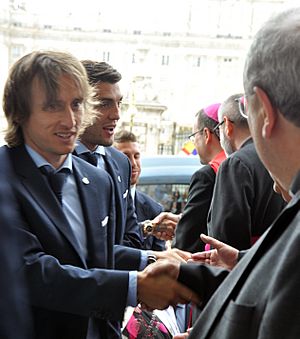
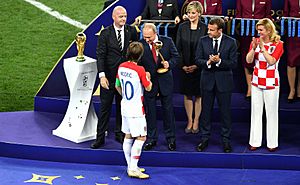
Dinamo Zagreb
- Prva HNL: 2005–06, 2006–07, 2007–08
- Croatian Cup: 2006–07, 2007–08
- Croatian Super Cup: 2006
Real Madrid
- La Liga: 2016–17, 2019–20, 2021–22, 2023–24
- Copa del Rey: 2013–14, 2022–23
- Supercopa de España: 2012, 2017, 2020, 2022, 2024
- UEFA Champions League: 2013–14, 2015–16, 2016–17, 2017–18, 2021–22, 2023–24
- UEFA Super Cup: 2014, 2016, 2017, 2022, 2024
- FIFA Club World Cup: 2014, 2016, 2017, 2018, 2022
- FIFA Intercontinental Cup: 2024
Croatia
- FIFA World Cup runner-up: 2018; third place: 2022
- UEFA Nations League runner-up: 2022–23
Individual
- Ballon d'Or: 2018
- Bosnian Premier League Player of the Year: 2003
- Best Croatian U-21 player: 2004
- Croatian Football Hope of the Year: 2004
- Croatian Footballer of the Year: 2007, 2008, 2011, 2014, 2016, 2017, 2018, 2019, 2020, 2021, 2022, 2023, 2024
- HNL's Footballer of the Year: 2007
- Prva HNL Player of the Year: 2007
- SN Yellow Shirt Award: 2007–08
- UEFA European Championship Team of the Tournament: 2008
- Tottenham Hotspur Player of the Year: 2010–11
- IFFHS World Team of the Decade: 2011–2020
- IFFHS UEFA Team of the Decade: 2011–2020
- UEFA Champions League Squad of the Season: 2013–14, 2015–16, 2016–17, 2017–18, 2020–21
- UEFA Champions League Team of the Season: 2021–22
- La Liga's Best Midfielder: 2013–14, 2015–16
- Football Oscar for Best Croatian Player: 2013, 2014, 2015, 2016, 2017, 2018, 2019, 2020, 2021, 2022, 2023, 2024, 2025
- FIFA FIFPRO World 11: 2015, 2016, 2017, 2018, 2019 2022
- La Liga Team of the Season: 2015–16, 2021–22, 2022–23
- UEFA La Liga Team of the Season: 2015–16
- FIFA Club World Cup Silver Ball: 2016
- ESPN Midfielder of the Year: 2016, 2017, 2018
- UEFA Team of the Year: 2016, 2017, 2018
- UEFA Champions League Midfielder of the Season: 2016–17, 2017–18
- IFFHS Men's World Team: 2017, 2018, 2022
- FIFA Club World Cup Golden Ball: 2017
- FIFA World Cup Golden Ball: 2018
- FIFA World Cup Fantasy Team: 2018
- FIFA World Cup Dream Team: 2018
- UEFA Men's Player of the Year Award: 2017–18
- The Best FIFA Men's Player: 2018
- IFFHS World's Best Playmaker: 2018
- Goal 50: 2017–18
- World Soccer Player of the Year: 2018
- The Guardian Best Footballer in the World: 2018
- AIPS Athlete of the Year: 2018
- Dongqiudi Player of the Year: 2018
- HNS Trophy for Best Croatian Player: 2018
- HOO Sportsman of the Year: 2018
- SN Sportsman of the Year: 2018, 2022
- Franjo Bučar State Award for Sport – Yearly Award: 2018
- Honorary citizen of the city of Zadar (2018) and Zadar County (2019)
- City of Zadar Award: 2018
- BTA Best Balkan Athlete of the Year: (2018)
- Golden Foot: 2019
- Real Madrid Player of the Season: 2020–21
- ESM Team of the Year: 2021–22
- Marca Leyenda Award: 2022
- FIFA World Cup Bronze Ball: 2022
- FIFA World Series ACUD Cup: 2024 Best Player
Orders
- Order of Duke Branimir: 2018
- Charter of the Republic of Croatia: 2024
Images for kids
See also
 In Spanish: Luka Modrić para niños
In Spanish: Luka Modrić para niños
 | Janet Taylor Pickett |
 | Synthia Saint James |
 | Howardena Pindell |
 | Faith Ringgold |


